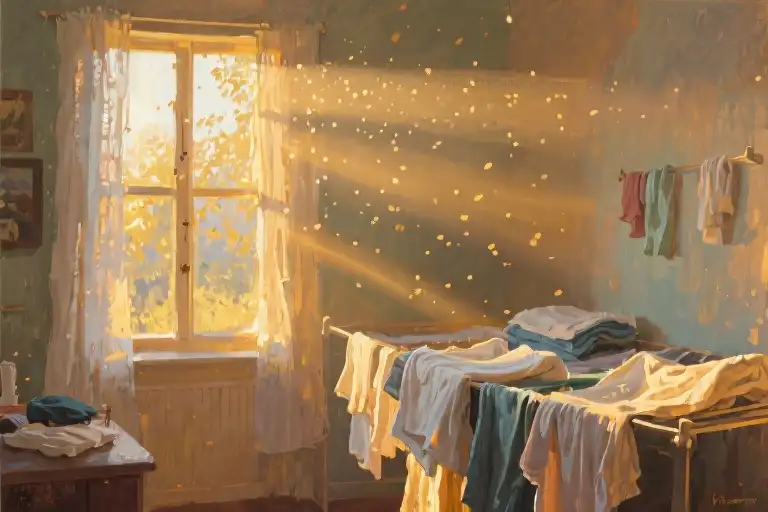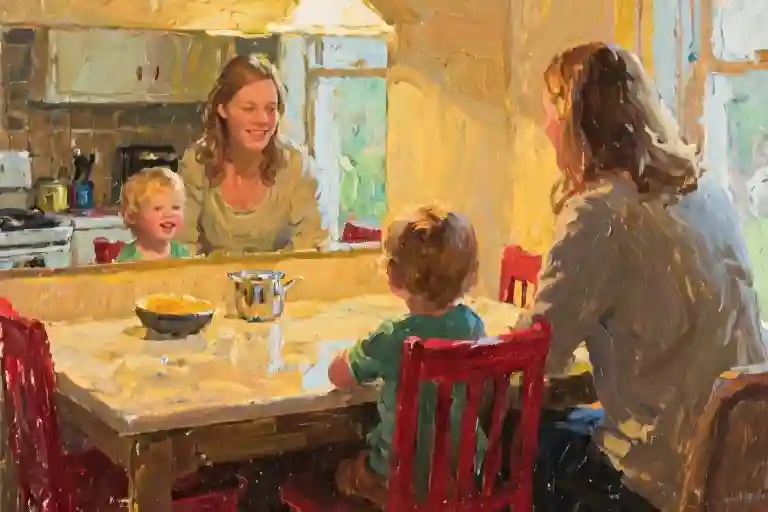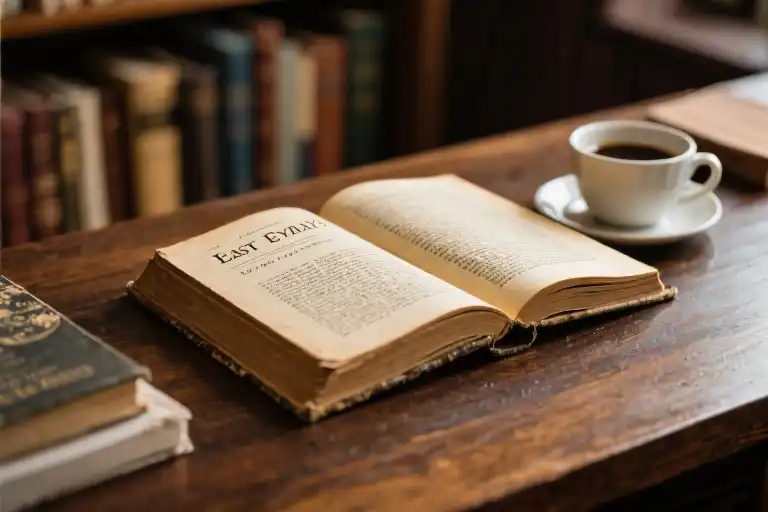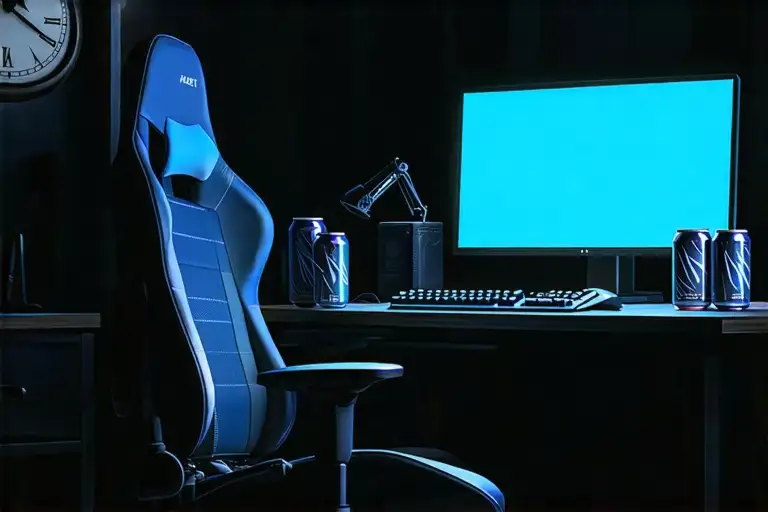Golden light streamed through the living room window, catching motes of dust in its beam as they swirled in silent chaos. The hum of distant traffic blended with the rhythmic rustle of fabric – my mother methodically folding laundry in her favorite armchair, each precise crease a counterpoint to my unraveling thoughts.
I traced the path of a particularly stubborn dust particle with my eyes, watching it rise and fall unpredictably. It mirrored the restless tug-of-war in my mind: the urge to create pulling against the fear of inadequacy, wanderlust wrestling with stability, countless passions vying for attention like overeager children.
‘If I chase everything, will I become nothing?’ The unspoken question hung heavier than the humid summer air. My fingers absently picked at the couch’s worn upholstery while mental checklists scrolled endlessly – unfinished manuscripts, unbought plane tickets, unlearned skills all piling up like my mother’s neat stacks of folded t-shirts.
The golden hour light, usually comforting, now felt like a spotlight on my indecision. Each dancing dust mote seemed to whisper about paths not taken, about the societal pressure to specialize in a world that celebrated my generation for being ‘multipotentialites’ while simultaneously demanding laser-focused expertise.
Across the room, my mother smoothed a stubborn wrinkle from one of my father’s dress shirts with practiced patience. I wondered if she sensed the quiet crisis unfolding three feet away – the way young adults often believe their turmoil is invisible until someone names it aloud. The folding continued, the quiet domestic ritual undisturbed by my internal storm.
Outside, a car door slammed. Somewhere down the street, a dog barked twice before being shushed. Ordinary sounds that usually faded into background noise now felt amplified, each one a reminder of life moving forward while I remained paralyzed by possibility. The dust motes kept dancing, indifferent to my existential calculus.
My mother finally broke the silence with the observational superpower unique to parents who’ve spent decades reading unspoken cues. ‘You’re quieter than usual today,’ she remarked, not looking up from matching a pair of socks. The simplicity of the statement somehow made the weight in my chest heavier and lighter simultaneously – seen but not judged, noticed but not pressured.
I watched as she folded the cuff of a sleeve exactly one inch, then again, creating the perfect crease. There was comfort in her certainty, in knowing precisely how to transform something shapeless into something orderly. If only life ambitions could be pressed into submission with the same methodical precision.
The Silent Question
The golden afternoon light slanted through the living room window, catching motes of dust that swirled like tiny constellations. I sat curled on the sofa, knees drawn up, watching my mother’s practiced hands smooth wrinkles from a freshly washed blouse. The rhythmic rustle of fabric filled the quiet space between us – a comfortable silence that usually felt peaceful, but today pressed against my ribs like unanswered questions.
‘You’ve been quiet today,’ she observed without looking up, her fingers deftly turning a sleeve inside out. The ordinary remark hung in the air, weighted by all the things I hadn’t been saying.
I picked at a loose thread on my sweater, the words tumbling out before I could stop them. ‘What if I never become anything?’ The vulnerability of the admission made my throat tighten. ‘I want to do everything – write novels, design gardens, study astronomy – but everyone says you have to specialize. If I don’t choose one path, will I just end up being… nothing?’
The folding paused. My mother’s hands stilled mid-crease, the half-folded blouse resting in her lap like a surrendered flag. When she finally spoke, her voice carried the quiet certainty of someone who’d weathered similar storms. ‘That’s a heavy thought to carry alone.’
Outside, a bicycle bell chimed as someone rode past our window. The normalcy of the sound contrasted sharply with the turmoil inside me. I pressed on, the fears I’d been stockpiling for months spilling over. ‘I keep reading about these incredibly successful people – the prodigies who published at twenty, the CEOs who changed industries before thirty. What if wanting too many things means I’ll never be exceptional at any of them?’
My mother set aside the laundry and reached for my restless hands. Her palms felt warm and slightly rough from years of gardening. ‘Let me ask you something,’ she said, her thumb brushing over my knuckles. ‘Who decided that being multifaceted makes you insignificant?’
The question landed like a stone in still water, ripples spreading through my assumptions. I opened my mouth to respond but found no ready answer. The pressure to specialize hadn’t come from any single source – not from my professors, not from career counselors – but from some amorphous cultural expectation I’d absorbed without examination.
A car horn sounded in the distance as evening settled around us. The dust motes we’d been watching earlier now glowed like fireflies in the fading light. ‘Uncertainty feels like failure,’ I admitted softly. ‘But choosing one path means giving up all the others.’
My mother’s smile held generations of quiet wisdom. ‘Or perhaps it means you get to walk many paths, just not all at once.’ She picked up the half-folded blouse again, smoothing the fabric with renewed purpose. ‘The fear of becoming nothing? That’s the shadow side of having the courage to imagine everything.’
As the last rays of sunlight stretched across the floorboards, I realized something fundamental had shifted. The question wasn’t whether I’d become nothing by wanting everything – but whether I could reframe uncertainty not as a threat, but as the necessary space where possibilities take shape.
The Liberating Question That Changed Everything
My mother set down the half-folded sweater with deliberate care, fabric whispering against the coffee table. The afternoon light caught the fine lines around her eyes as she tilted her head – that familiar look when she was about to say something that would unravel my tightly wound assumptions.
“Who decided that being multifaceted makes you worthless?”
The question hung between us like dust motes suspended in sunlight. I opened my mouth, then closed it, realizing I’d never actually examined this belief I’d been carrying like a stone in my pocket.
She reached for her tea, the ceramic cup clinking softly against the saucer. “When I was twenty-three,” she began, her voice taking on that storytelling rhythm I loved, “I nearly gave up watercolor painting because my instructor said I’d never master it unless I quit my nursing studies.”
A distant truck rumbled past outside as she continued. “For weeks I agonized – medicine or art? As if choosing one meant murdering the other.” Her fingers traced the rim of her cup. “Then one rainy Tuesday, I skipped anatomy class and went to the botanical gardens with my sketchbook. Drew the most terrible, wonderful ferns you ever saw.”
I found myself smiling at the image – young Mom defiantly painting ferns in the drizzle. “What happened with the instructor?”
“Oh, he failed me,” she laughed, the sound warm as the sunlight pooling at our feet. “But that semester I discovered medical illustration. Turns out, knowing both anatomy and color theory made me uniquely qualified.”
Her story settled over me like the golden hour light now stretching across the floorboards. The fear I’d been carrying – that pursuing multiple passions would dilute my worth – began to feel less like truth and more like an outdated script I could rewrite.
“We treat interests like they’re jealous lovers,” Mom mused, picking up another shirt to fold. “But skills cross-pollinate in the most unexpected ways. That painting class? Taught me observation skills that made me a better nurse.”
Outside, a bicycle bell chimed as someone rode past. The ordinary sound somehow underscored her extraordinary point: life wasn’t about narrowing down, but about letting our curiosities converse with each other. Maybe my love for writing could inform my photography, or my wanderlust fuel my essays.
Mom smoothed the folded shirt into the basket, her hands moving with the quiet certainty of someone who’d made peace with life’s contradictions. “The world needs specialists, yes. But it also needs bridges – people who can translate between worlds.”
As the last word lingered, I noticed how the sunlight had crept up the wall, transforming the room minute by minute. Much like this conversation was transforming my understanding of what it meant to build a meaningful life – not by subtraction, but by multiplication.
Three Glimmers of Perspective
My mother set aside the last folded shirt and reached for a photo album tucked beneath the coffee table. The leather cover was worn at the edges, whispering of years spent being opened and closed like a well-loved book.
1. The Baking Chronicles
She flipped to a page with flour-smudged Polaroids. ‘Remember Mrs. Henderson’s cinnamon rolls? Took me eleven attempts to get them right.’ Her finger traced a picture of lopsided pastries. ‘The sixth batch could’ve chipped teeth. The ninth tasted like cardboard. But the eleventh…’ She smiled at a photo of golden-brown spirals. ‘That’s when I learned failed batches aren’t wasted time—they’re elimination rounds.’
I studied the progression. The early disasters, the gradual improvements, the final triumph. ‘You never told me this part.’
‘Because the lesson wasn’t in the perfect rolls,’ she said, turning the page. ‘It was in realizing expertise isn’t a prerequisite for joy. Mrs. Henderson still asks for my “famous” recipe—the one born from all those flops.’
2. The Gardener Next Door
The album landed on a snapshot of our elderly neighbor kneeling in soil. ‘Mr. Calloway never won a gardening prize,’ Mom noted. ‘His roses had black spots. Tomatoes split if they grew at all.’ She tapped the photo. ‘But every morning at 7 AM, rain or shine, he’d be out there humming Sinatra to his hydrangeas.’
‘You’re saying we should aim for mediocrity?’ I teased.
She swatted my knee. ‘I’m saying his definition of success was dirt under his nails and beauty he created himself. Not blue ribbons or magazine features.’ The next page showed him beaming beside lopsided sunflowers. ‘His garden was perfectly imperfect—just like its gardener.’
3. The Many Lives of Margaret
The final section revealed my mother’s own zigzagging path: college dropout turned bookstore clerk turned graphic designer. ‘This,’ she said, pointing to her twenty-three-year-old self behind a cash register, ‘was when I thought failing at law school meant I’d failed at life.’ Another photo showed her at thirty, squinting at a computer screen. ‘And this was me learning design from library books at midnight.’
I touched the edge of a picture where she held a prototype of her first freelance project. ‘You never seemed lost in these.’
‘Oh, I was terrified,’ she laughed. ‘But looking back, I see the thread—every phase taught me something the next one needed.’ She closed the album gently. ‘We don’t become one thing, sweetheart. We accumulate layers, like trees adding rings.’
Outside, the sun dipped lower, stretching our shadows across the photo-strewn couch. The dust motes still floated in the amber light, but now they looked less like chaos and more like possibility—countless particles, each catching the light in its own way.
Small Steps Forward
The room had grown quieter as evening approached, the golden light now dimming into softer hues. My mother finished folding the last shirt, smoothing its wrinkles with her palms before setting it aside. She turned to me, her expression thoughtful yet gentle.
“You know,” she said, her voice carrying that quiet wisdom I’d come to rely on, “whenever I feel stuck, I start with something small. Something so simple it’s impossible to fail at.”
I raised an eyebrow. “Like what?”
She gestured toward the notebook lying forgotten on the coffee table. “Why don’t you try writing a short story today? Just 200 words. Not a novel, not a masterpiece – just a tiny fragment of whatever’s in your head right now.”
I picked up the notebook, its familiar weight comforting in my hands. The blank page stared back at me, both intimidating and inviting. My fingers traced the edge of the paper as I considered her suggestion.
“What would I even write about?” I murmured, more to myself than to her.
My mother smiled, nodding toward the sunbeam still illuminating dust particles in the air. “You’ve been watching those dust motes dance all afternoon. Maybe start there.”
I opened the notebook to a fresh page, the spine creaking slightly. The pen felt unfamiliar at first, my grip awkward from disuse. Then, slowly, words began to form:
This is a story about dust.
Not ordinary dust – the kind that catches sunlight just so, transforming from mere particles into floating gold. The kind that reminds us how even the smallest things can become beautiful when touched by light.
As I wrote, something unexpected happened. The tightness in my chest eased, replaced by a quiet focus. The words didn’t flow perfectly – they stumbled, crossed out, restarted – but they existed. And for now, that was enough.
My mother watched silently, her presence steady like the fading light through the window. When I finally looked up, she simply said, “See? You didn’t need to write the Great American Novel today. Just a few honest words.”
I stared at the half-filled page, realizing she was right. This small act contained its own kind of magic – not because it was extraordinary, but precisely because it wasn’t. The pressure to create something monumental had vanished, leaving only the simple pleasure of putting thoughts to paper.
“What if,” my mother continued, “instead of worrying about becoming everything, you focused on doing one small thing each day? Not to be the best, but just to explore?”
She reached into her pocket and produced a small, worn notebook of her own. “I’ve kept this for years,” she explained, flipping through pages filled with sketches, recipes, and short observations. “Some days it’s a paragraph, others just a sentence. The point isn’t perfection – it’s paying attention.”
I thought about all the times I’d abandoned projects because they didn’t meet some impossible standard I’d set for myself. How many ideas had I discarded before giving them room to breathe? How many possibilities had I dismissed because they didn’t fit a narrow definition of success?
Outside, the first stars began appearing in the darkening sky. I closed my notebook, but differently this time – not with frustration, but with the quiet satisfaction of having begun. The story about dust remained unfinished, and that was okay. It existed, and that was everything.
My mother stood, gathering the folded clothes into a basket. “Tomorrow,” she said, “you could write 200 more words. Or try drawing those dust motes instead. Or do something completely different. The choice is yours – and none of them would be wrong.”
As she walked toward the hallway, she paused at the doorway. “Remember, uncertainty isn’t your enemy. It’s just space – space for you to grow into.”
Alone in the quiet living room, I looked back at my notebook. The first sentence stared up at me, simple and true. Nearby, dust motes continued their silent dance in the lamplight, no longer symbols of my scattered thoughts, but of possibilities still taking shape.
The Middle of Becoming
The evening had settled in quietly, the golden light replaced by the soft glow of a desk lamp. Dust particles still floated in the air, but now they moved differently—no longer chaotic specks in harsh sunlight, but gentle dancers in the warm lamplight, each one catching the illumination like tiny stars. I watched them for a moment, thinking about how something as insignificant as dust could look so beautiful under the right light.
My notebook lay open on the desk, the page filled with scribbled thoughts, half-formed ideas, and the beginnings of a story I had started after my conversation with my mother. The first line read: “This is a story about dust—about how even the smallest, most overlooked things can hold meaning when seen in a new light.” It wasn’t polished or perfect, but it was a start. And for the first time in a long while, that felt like enough.
I ran my fingers over the page, feeling the slight indentations where my pen had pressed too hard. The words were messy, the sentences uneven, but they were mine. They were proof that I had tried, that I was trying. Not to be the best, not to have all the answers, but simply to explore what called to me.
Outside, the world continued—cars passed, people laughed somewhere down the street, and the night deepened. But here, in this small pool of lamplight, everything felt suspended, like I was standing on the threshold of something I couldn’t yet name. The fear of being nothing, of failing, hadn’t vanished completely, but it no longer felt like a weight dragging me down. Instead, it had softened into something more manageable, like background noise rather than a deafening roar.
My mother’s words echoed in my mind: “You’re not nothing because you want many things. You’re everything because you have the courage to dream in the first place.” I hadn’t fully understood what she meant earlier, but now, as I looked at the dust swirling in the lamplight, it clicked. Life wasn’t about reaching a final destination where everything made sense and all my doubts disappeared. It was about the becoming—the messy, uncertain, beautiful process of figuring it out as I went.
I closed the notebook gently, leaving the story unfinished for now. There would be time to return to it, to revise or scrap it entirely, to try again. And that was okay. The notebook itself was proof that I didn’t have to be one thing, that I could explore and change my mind and start over. The pages were blank, waiting. The dust still floated, untethered but not lost.
Maybe I didn’t need to know exactly who I was becoming. Maybe the not-knowing was part of the point. I smiled to myself, a small, quiet thing, and turned off the lamp. In the darkness, the dust disappeared from view, but I knew it was still there—just like all the possibilities I couldn’t yet see.
Maybe I’m not lost, I thought. Maybe I’m just in the middle of becoming.





